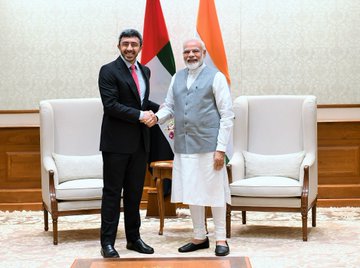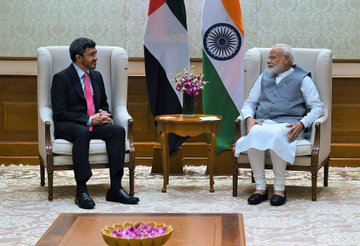Azad Essa
Leaders of the Muslim world have failed to take India to task for the ongoing repression of Kashmiri citizens
Men drive past a member of India's security forces in Srinagar, Kashmir on 20 August (AFP)
It has been more than two weeks since India issued a decree that stripped Kashmir of its semi-autonomous status, and the region remains under lockdown.
Telephone and internet services remain disconnected; movement is restricted; activists, politicians and even children have been arrested; and tens of thousands of Indian troops continue to patrol the streets of towns and villages.
India's decision to scrap Article 370, the constitutional clause outlining Kashmir's semi-autonomous status, is an unambiguous provocation with the potential to inflame all of South Asia.
Despite the outrage among select Muslim publics around the globe, and the fact that it has been denounced by observers as evidence of India's rapid slide into authoritarianism and feverish disregard for minorities, it has elicited a meagre response from leaders in the Arab world.
Muted response
Barely 24 hours after the BJP-led government announced its decision, the UAE's ambassador to New Delhi called the decision an internal matter, adding that it would "improve social justice and security and confidence of the people in the local governance and ... encourage further stability and peace".
Though the UAE's foreign ministry has since issued a more staid response, the ambassador's initial comments were viewed by observers as more representative of the government's position.
Saudi Arabia called on "the concerned parties in Jammu and Kashmir to maintain peace and stability in the region and to take into account the interests of the people of the region", while Qatar's foreign ministry issued a brief statement calling on its citizens to leave Kashmir "in light of recent developments". It said nothing of the scale of repression in Kashmir, nor did it express any concern for the Kashmiri people.
Actions and statements that might initially have been perceived as evasive have since been revealed as a quiet nod of approval from the Arab elite
After a conversation with Pakistani Prime Minister Imran Khan, the king of Bahrain said his country was "monitoring the developments in Kashmir with deep concern and hoped that all issues would be resolved through dialogue", according to a statement from Khan's office. This "deep concern" was evident when Bahrain's interior ministry announced it would take legal action against a group of worshippers who protested in support of Kashmir after Eid prayers. Overnight, social media accounts of those who spoke or shared videos of the protest disappeared.
Meanwhile, the Organisation of Islamic Cooperation (OIC), a pan-Islamic body made up of 57 countries, condemned India for imposing religious restrictions on Kashmiri Muslims - a position one Kashmiri academic called "hypocritical", given the OIC's ongoing silence over the broader indignities being meted out to people in the valley.
Economic implications
The absence of Arab leadership on this issue is unsurprising, given the fraught social contract that exists in the Arab world itself, in addition to the region's failure to address the persecution of Rohingya Muslims in Myanmar, China's targeting of Uighurs, or the campaign against the Muslim minority in the Central African Republic. Then there is Yemen, home to the world's most devastating man-made humanitarian disaster, courtesy of the regional Muslim elite.
While Israel is crucial to the Saudi-UAE-Egyptian axis in suppressing the democratic ambitions of Arab populations, India and China are seen as fundamental to the economies of the Middle East. There is a mutual policy to avoid publicly challenging each other's domestic affairs.
So when the Saudi-led blockade of Qatar began in 2017, for example, India described it as "an internal matter of the GCC", while simultaneously organising India-Qatar flights.
India's power is palpable. Not only is it the third-largest energy consumer on the planet, with more than 60 percent of its oil imported from the Middle East, it is also the UAE's second-largest trade partner. And although Kashmir is an international dispute, India has worked tirelessly to convince its partners to frame it as an internal affair.
The alignment of geopolitical interests has reformulated the India-Gulf relationship. It is much more strategic, drawing close to the Israel-Saudi-UAE axis without alienating Iran - even though India has stopped purchasing Iranian oil due to the reimposition of US sanctions. While Iran has traditionally been vocal on Kashmir, it has been less so this time around.
Arab betrayal
Actions and statements that might initially have been perceived as spineless and evasive have since been revealed as a quiet nod of approval from the Arab elite.
Last week, Saudi Arabia's relationship with India deepened, as the Saudi state-owned Aramco announced it would buy a 20 percent stake in the petroleum operations of Reliance Industries, one of India's largest companies.
The deal will see Riyadh working with a company owned by Mukesh Ambani, the richest man in Asia. Ambani, known to enjoy close ties with Indian Prime Minister Narendra Modi, is expected to play a seminal role in India's economic conquest of Kashmir. After a call from Modi last week for investments in Kashmir, Ambani said he would put together a "special task force" to tackle "developmental needs" in Kashmir.
In the same vein, India this week announced that the UAE and Bahrain would host Modi on state visits. It also said that the UAE would be awarding Modi the Order of Zayed, the country's highest civilian award, and that his trip to Bahrain will be the first ever by an Indian prime minister.
That Saudi Arabia would call for all parties to "take into account the interests of the people of the region", and then work with a company seeking to take advantage of these same people, gagged and under siege; and that the UAE would dare to decorate Modi at this time; and that Bahrain would likewise unashamedly host him when the fate of Kashmiris is still unknown, illustrates the extent to which Arab authoritarians would go to discredit the legitimate grievances of the people, for fear of what it may eventually mean for themselves.
As Israel has done with Palestine, India's attempt to frame the unrest in Kashmir as a religious issue - a talking point even repeated by US President Donald Trump - and its repression as necessary in the fight against terror, has in part been facilitated by a rise in Saudi-sponsored mosques and Wahhabist teachings in the valley.
This has allowed India to conflate pro-freedom leaders with "extremism" and to blame Pakistan for "exporting" dissent, even though self-determination is a UN promise and the resistance has always been largely homegrown.
The weak and pitiful comments from the Arab elite in relation to Kashmir reveal that the settler-colonial project is not something they oppose, but a development with which they are fully on board.






No comments:
Post a Comment